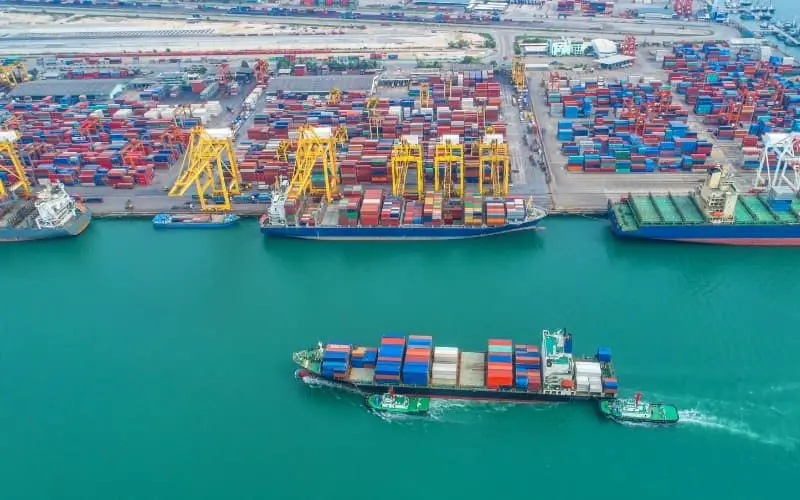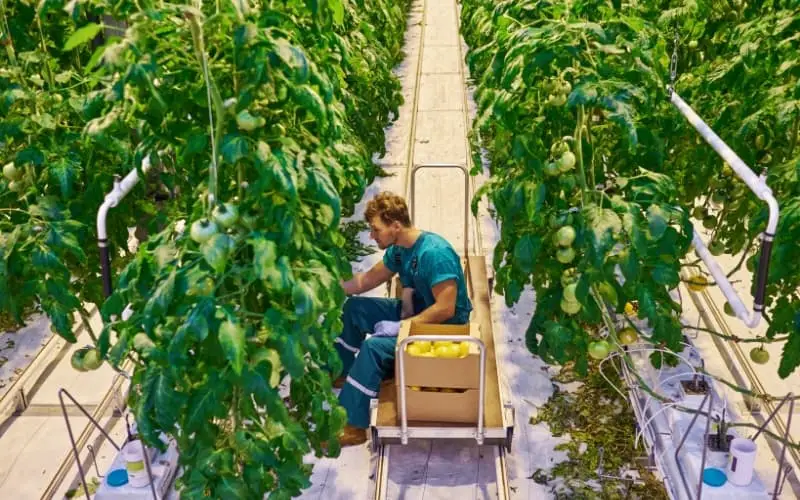

The Netherlands is the second biggest agriculture and food exporter in the world! Even with just a low population of 17 million people, the Netherlands has consistently been among the top contenders in the food export market. This brings the question of "why does the Netherlands export so much food?".
Food exports are an important source of income for the Netherlands. Agricultural exports represent 1.4% of GDP. The efficient ways of farming and agriculture, allow the Netherlands to export a lot. Which brings in a lot of money for the Dutch economy.
Farming efficiently and on such a large scale is a complicated process and it requires many innovative minds and workers. There is no one secret recipe to being efficient, green, and successful in the agriculture industry, but a combination of several techniques and years of hard work helped the Dutch to get where they are. So let’s take a look at how exactly the Netherlands became a food export giant, and why they export so much food.
The Netherlands exports so much food, because they are good at it. Their efficient ways of farming and agriculture have been bringing in great things for the national economy. While only employing 2% of the labor force, they provide huge surpluses for processing food.
The Netherlands is one of the largest countries when it comes to the export of agricultural goods such as meat, dairy, eggs, vegetables, and fruit.
Food exports create a huge number of jobs in the Netherlands, in various sectors that work closely together. Due to the large amount of food that the Netherlands exports, many billions of euros enter the Dutch economy every year.
Running at the front lines of the food export industry comes with years of hard work and innovation from the Netherlands.
Here are some of the reasons as to why the Netherlands exports so much food, and how they got the title of one of the second biggest food exporters in the world.
The climate, the fertile soil, and the flatlands make the Netherlands the perfect place for farming. Crops grow relatively easily and animals can be effectively reared in large, green fields, providing the optimum conditions for agriculture.
All of this makes perfect sense for the Government and its people to focus on agriculture and make the best use of their blissful natural resources. It is only natural for a country with such a farm-friendly environment to focus on agriculture.
Perhaps the most important feature of Dutch farming is their use of technology and how they have mechanized the process.
Labor in the Netherlands is expensive, so farmers and companies have learned to adapt and develop ways to reap the maximum benefits using minimum resources.
They use robots for picking soft fruits instead of employing people, use machines to separate meat, and process potatoes.
They use robots to do the milking of the cows as well! Everything from drones to automated tractors is helping automate the farming process and thus making it more efficient.
The geographical location of the Netherlands also plays a part in why the Netherlands is going so strong on agriculture. Their famous ports like Amsterdam and Rotterdam are responsible for receiving most of the imports of Europe.
And this allows the Netherlands to also have the opportunity to distribute their own products at less expense and far more efficiently than neighboring countries. And that’s why they are so fixated on exporting their produce.
It is very important to note that in using innovative ways to farm and employing technology instead of people, the Netherlands has also been heavily moving towards more sustainable solutions.
They use methods that are better for the environment, while still producing a lot more food.
For example, some Dutch farmers grow their tomatoes in greenhouses, which use geothermal energy to produce heat for the tomato plants. These plants are grown in a hydroponic system so that they require less water.
The tomatoes grow in Rockwool substrate which is made by spinning molten basaltic rock into fine fibers containing nutrients. These allow the plants to soak up nutrients, even when the moisture is low.
This is just an example of how Dutch farmers use techniques to reduce their impacts on the climate while still providing amazing results.
The Netherlands also emphasizes the importance of education when it comes to agricultural development. Their workforce is highly educated and specialized in this field.
The Wageningen University of Netherlands is the best institute for agricultural education in the world.
Furthermore, there are plenty of research facilities that are finding even better and more efficient, and sustainable ways to farm daily.
These include large food and drink companies like Heinz and Danone, which have their research facilities located in the Netherlands.

All of these factors working together make the Netherlands the food exporting giant that it is. It seems like the whole world can learn something from how the Netherlands produces food.
They are innovating new, sustainable ways to farm without compromising numbers and produce.
Yet there are also many opponents in the Netherlands against the mass production of food for export. Although more and more new techniques are being introduced to combat emissions, the Netherlands must do everything it can to achieve the climate targets.
According to many political parties, this goal can only be achieved by reducing livestock numbers. This causes a lot of discussion in Dutch politics, but also demonstrations by Dutch farmers.
In 2019, the export of agricultural goods reached up to an amazing 94,5 billion euros (112,6 billion dollars). This accounted for a 4.6% increase since 2018.
Agricultural trade alone makes up more than half of the total surplus in the trade of goods in the Netherlands.
The export value of meat has increased by at least 8% in 2019, while the export value of pork alone to China has tripled that year. It rose from about €117 million ($139 million) from the previous year to about €377 million ($449 million) in 2019.
About two-thirds of this growth can be attributed to export prices increasing, while the rest is due to an increase in export volume.
Most of these exports go to Germany, which took up about a quarter of the total exports. Belgium and the United Kingdom are the next to follow.
Both processed and unprocessed food, which makes up the primary and secondary agricultural goods, accounted for an increase of about 42 billion euros (50 billion dollars) in 2019 to the Dutch economy.
While some of the exports were due to agricultural goods that were imported to the Netherlands, processed, and then re-exported, about 92% was due to the food produced in the Netherlands.
The Netherlands exports almost everything from vegetables to poultry to even fruits. They are the largest exporter in the world when it comes to tomatoes.
They export pork, chicken, eggs, beef, processed meats, fruits, vegetables, beer, and dairy products.
Apples and pears are regularly exported to Vietnam, while the Americans seem to love Dutch eggs. The Netherlands also exports its famous cheese!
They are also the top exporter when it comes to onions and potatoes and the second-largest exporter of vegetable oil. Even in terms of vegetable seeds, the Netherlands produces more than a third of all global trade in vegetable seeds.
As you have been able to read, the Netherlands earns a lot of money from the export of food. The Netherlands also earns money in various other ways. Read one of our other articles to learn more about this.
- Why Is The Netherlands So Rich And Wealthy?
- Why Does The Netherlands Grow Tulips?
- What Is The Netherlands Best At? 10 Things You Didn't Know
Hopefully, this article has given you an answer to the question: "why does the Netherlands export so much food?".
Using innovative techniques and sustainable solutions is perhaps the main reason why the Netherlands can export so much food. They have made an oath of “producing twice as much food using half as many resources”, and they are well on their way to proving this true.
The Netherlands is paving the path for the whole world to follow into farming for the future.